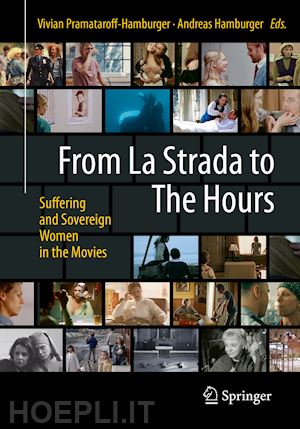

Questo prodotto usufruisce delle SPEDIZIONI GRATIS
selezionando l'opzione Corriere Veloce in fase di ordine.
Pagabile anche con Carta della cultura giovani e del merito, 18App Bonus Cultura e Carta del Docente
The book covers a wide range of cinematic femininities: It starts with Marilyn Monroe’s cool phrase "We are all of us stars, and we deserve to twinkle", which self-confidently marked her profession - with a wink, because she did not say "to sparkle". The (self-) staging of women also ironically plays its being tailored to the male gaze. In this section we discuss movies like Some like it hot, Breakfast at Tiffany’s, Cet obscur objet du désir and Le Mépris - with a notable chapter by Laura Mulvey. Moreover, some fifty films later, the book ends with a section on Self-Empowerment and Identity, featuring films like Thelma & Louise, The Hours, Blue Valentine and Carol.
Are women in film really just those who are seen and displayed? Where are the ones who see and who point to something themselves? Where are the women in the audience, behind the camera? If, as feminist psychoanalytical film criticism rightly observes, the stars and starlets, especially in Hollywood mainstream cinema, are supposed to serve the male gaze as eye candy and self-assurance, what is the role of the women who do not fit into this scheme, the anti-heroes, the women who feel and act, those through whose eyes the world experiences a completely different way of being seen? Not only in arthouse cinema, but also in the mainstream, there is far more to the thousand facets of staged femininity than the simple formula of the male gaze. The book shows the most diverse stagings of femininity in great (and terrible) films, and explores (according to the approach of film psychoanalysis) how these staging affect the unconscious, or also the not-yet-conscious of viewers.
Each of the eight sections deals with a thematic aspect of the staging of suffering or sovereign femininity in feature films. They follow a chronological structure to illustrate how the genre has evolved. Each section is held together by an editorial introduction.
Vivian Pramataroff-Hamburger, Dr. med., specialist in gynaecology and psychotherapy in Munich, board member of the German Society for Psychosomatic Obstetrics and Gynaecology (DGPFG) and the International Society for Psychosomatic Obstetrics and Gynecology (ISPOG), training therapist and supervisor (BLÄK), member of the Munich Study Group on Film and Psychoanalysis since 2007, numerous publications on film and psychoanalysis.
Andreas Hamburger, Prof. Dr. phil. Dipl.-Psych., Professor of Clinical Psychology and Psychoanalysis IPU Berlin, Germanist, psychologist, psychoanalyst (DPG/IPA), training analyst and supervisor (DGPT, DGSv), member of the Munich Study Group on Film and Psychoanalysis since 2007, numerous publications on film and psychoanalysis, including the monograph Relational Film Psychoanalysis.











Il sito utilizza cookie ed altri strumenti di tracciamento che raccolgono informazioni dal dispositivo dell’utente. Oltre ai cookie tecnici ed analitici aggregati, strettamente necessari per il funzionamento di questo sito web, previo consenso dell’utente possono essere installati cookie di profilazione e marketing e cookie dei social media. Cliccando su “Accetto tutti i cookie” saranno attivate tutte le categorie di cookie. Per accettare solo deterninate categorie di cookie, cliccare invece su “Impostazioni cookie”. Chiudendo il banner o continuando a navigare saranno installati solo cookie tecnici. Per maggiori dettagli, consultare la Cookie Policy.